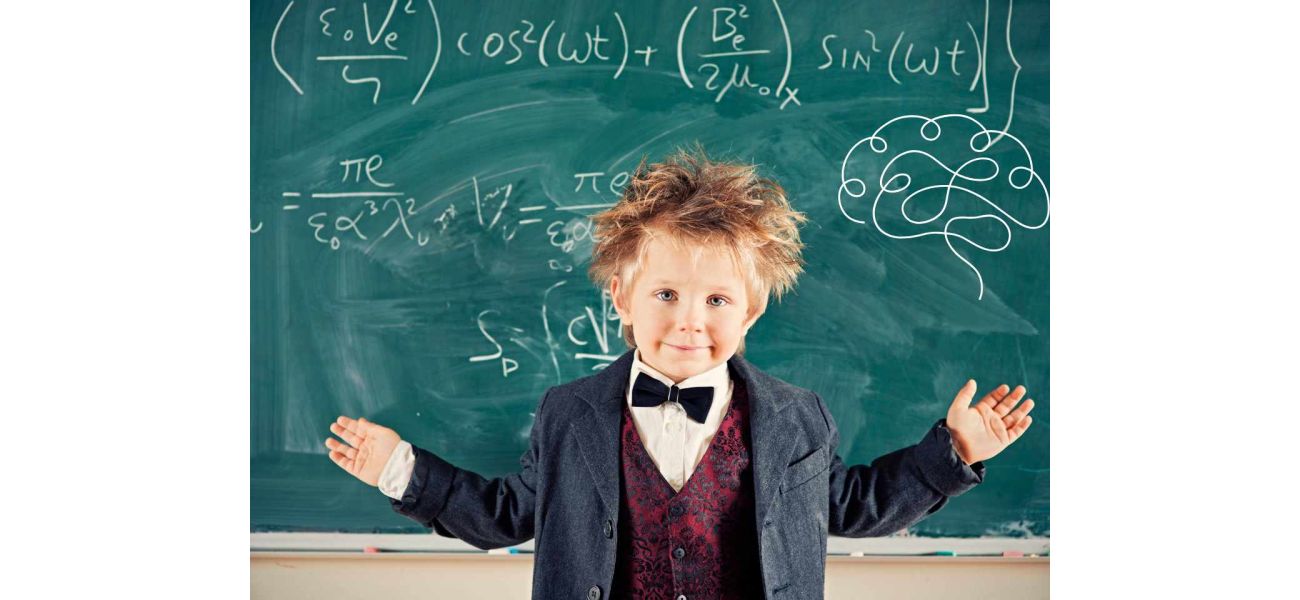"Explore the brilliance of the greatest minds in history with this fascinating book."
Throughout history, exceptional people have challenged limits and changed the world in various ways. But who is the smartest? Measuring intelligence is still complicated.
April 10th 2025.

Throughout human history, there have been extraordinary individuals who have pushed the boundaries of what we thought was possible. Their brilliance has taken on many different forms - some were mathematical wizards, others were artistic visionaries, and many were revolutionary thinkers who changed the way we see the world. But the question remains, who can truly claim the title of the smartest person of all time?
The concept of intelligence itself is a complex and multifaceted one. How do we measure it? Is it the ability to solve problems, to see connections that others miss, to memorize vast amounts of information, or perhaps it's the application of knowledge in ways that transform our understanding of the world? The smartest people in history were not just high-IQ geniuses, they possessed emotional intelligence, social awareness, and a relentless curiosity that often left them misunderstood in their own time. So, let's take a journey through history to explore the minds of some of the greatest thinkers and their remarkable achievements.
Isaac Newton, the architect of modern science, revolutionized our understanding of the universe in a way that few others have. In just 18 months, during the years 1665-1666, he developed calculus, formulated his laws of motion, and conceived the theory of universal gravitation - all while in his early twenties. His work, "Philosophiæ Naturalis Principia Mathematica," laid the foundation for classical mechanics and his contributions to optics, including the invention of the reflecting telescope and his discovery that white light is composed of colors, were groundbreaking. Newton's unparalleled ability to derive fundamental laws from observation and mathematics makes him a strong contender for the title of the greatest scientific mind in history.
Leonardo da Vinci, often referred to as the original Renaissance man, was not just a painter, but a scientist, inventor, and visionary who was centuries ahead of his time. While most know him for masterpieces like the Mona Lisa, his notebooks reveal an astonishing mind. He designed flying machines 400 years before the invention of airplanes, made detailed anatomical drawings by dissecting human corpses, and even sketched early concepts for tanks and submarines. What made Leonardo truly special was his endless curiosity - he studied everything from water flow to human facial expressions. His ability to seamlessly combine art and science remains unmatched to this day.
Johann Wolfgang von Goethe, known for his contributions to literature, science, and philosophy, was a true all-rounder. While his dramatic work "Faust" may be his best-known piece, he was also a serious scientist who made important discoveries about plant growth and color theory. Unlike specialists who focus on one field, Goethe's genius was in connecting different areas of knowledge. He believed in seeing nature as a whole rather than separate parts, an approach that greatly influenced later scientists. His wide-ranging intellect makes him one of the last true polymaths in history.
Albert Einstein, the physics revolutionary, redefined our understanding of the universe with his theory of relativity. What's even more remarkable is that he did much of his groundbreaking work while employed as a patent clerk, proving that genius can flourish anywhere. His famous equation, E=mc², changed the field of physics forever, and his ideas about space and time formed the foundation of modern cosmology. Unlike some child prodigies, Einstein was not an early bloomer - he developed his revolutionary ideas through deep thought and imagination. His ability to question basic assumptions about reality was his true gift.
William James Sidis, often considered the ultimate child prodigy, displayed the most extreme early intelligence ever recorded. He was reading newspapers at just 18 months old, writing in four languages by age six, and entered Harvard at the young age of 11. With an estimated IQ of 250-300, he potentially holds the title of the smartest person in history in terms of raw brainpower. However, his tragic story serves as a reminder that intelligence alone does not guarantee happiness. Overwhelmed by public expectations, he eventually rejected his gifts and lived in isolation, working ordinary jobs. His life raises important questions about how society treats exceptional minds.
John von Neumann, often referred to as the human computer, had one of the most practical genius minds in history. He could recite entire books after reading them just once and could perform incredibly complex math equations in his head. During World War II, his calculations were crucial for developing the atomic bomb. Later, he pioneered the field of computer science, creating the architecture that still powers modern computers. Unlike many theorists, von Neumann applied his intelligence to real-world problems, making groundbreaking contributions in economics, physics, and computing. His ability to instantly grasp complex systems was legendary among his fellow scientists.
Stephen Hawking, the cosmic explorer, achieved greatness against all odds. Diagnosed with ALS at the young age of 21 and given just a few years to live, he went on to make groundbreaking discoveries about black holes and the origins of the universe. Despite being wheelchair-bound, his mind was one of the most brilliant in history. Hawking's genius was not just in his physics, but also in his ability to make complex ideas accessible to the general public through books like "A Brief History of Time." He proved that physical limitations cannot contain an extraordinary mind.
Terence Tao, often referred to as the math machine, represents modern genius at its finest. Solving college-level math problems at the age of nine and earning his PhD at just 20 years old, he is one of the most productive mathematicians alive. His work spans from number theory to equations that describe how materials behave. Unlike the stereotype of the isolated genius, Tao collaborates widely and shares his knowledge generously. He shows that today's brilliance often comes through teamwork rather than solitary thinking.
So, who can truly be considered the smartest person in history? It's impossible to measure intelligence across different eras and fields, but if we take into account various factors, we can narrow it down. In terms of mathematical and scientific genius, Newton and Einstein stand out. When it comes to raw brainpower, William James Sidis may have been the smartest. In terms of versatility, da Vinci and Goethe were masters of multiple disciplines. And in terms of practical genius, von Neumann was unmatched in his ability to apply his intelligence to real-world problems. But when we consider the lasting impact of someone's ideas, Einstein takes the crown. His theories continue to shape our modern world, from GPS to nuclear energy. However, the true lesson here is that genius comes in many forms, and the smartest person may very well be someone we haven't even met yet.
The concept of intelligence itself is a complex and multifaceted one. How do we measure it? Is it the ability to solve problems, to see connections that others miss, to memorize vast amounts of information, or perhaps it's the application of knowledge in ways that transform our understanding of the world? The smartest people in history were not just high-IQ geniuses, they possessed emotional intelligence, social awareness, and a relentless curiosity that often left them misunderstood in their own time. So, let's take a journey through history to explore the minds of some of the greatest thinkers and their remarkable achievements.
Isaac Newton, the architect of modern science, revolutionized our understanding of the universe in a way that few others have. In just 18 months, during the years 1665-1666, he developed calculus, formulated his laws of motion, and conceived the theory of universal gravitation - all while in his early twenties. His work, "Philosophiæ Naturalis Principia Mathematica," laid the foundation for classical mechanics and his contributions to optics, including the invention of the reflecting telescope and his discovery that white light is composed of colors, were groundbreaking. Newton's unparalleled ability to derive fundamental laws from observation and mathematics makes him a strong contender for the title of the greatest scientific mind in history.
Leonardo da Vinci, often referred to as the original Renaissance man, was not just a painter, but a scientist, inventor, and visionary who was centuries ahead of his time. While most know him for masterpieces like the Mona Lisa, his notebooks reveal an astonishing mind. He designed flying machines 400 years before the invention of airplanes, made detailed anatomical drawings by dissecting human corpses, and even sketched early concepts for tanks and submarines. What made Leonardo truly special was his endless curiosity - he studied everything from water flow to human facial expressions. His ability to seamlessly combine art and science remains unmatched to this day.
Johann Wolfgang von Goethe, known for his contributions to literature, science, and philosophy, was a true all-rounder. While his dramatic work "Faust" may be his best-known piece, he was also a serious scientist who made important discoveries about plant growth and color theory. Unlike specialists who focus on one field, Goethe's genius was in connecting different areas of knowledge. He believed in seeing nature as a whole rather than separate parts, an approach that greatly influenced later scientists. His wide-ranging intellect makes him one of the last true polymaths in history.
Albert Einstein, the physics revolutionary, redefined our understanding of the universe with his theory of relativity. What's even more remarkable is that he did much of his groundbreaking work while employed as a patent clerk, proving that genius can flourish anywhere. His famous equation, E=mc², changed the field of physics forever, and his ideas about space and time formed the foundation of modern cosmology. Unlike some child prodigies, Einstein was not an early bloomer - he developed his revolutionary ideas through deep thought and imagination. His ability to question basic assumptions about reality was his true gift.
William James Sidis, often considered the ultimate child prodigy, displayed the most extreme early intelligence ever recorded. He was reading newspapers at just 18 months old, writing in four languages by age six, and entered Harvard at the young age of 11. With an estimated IQ of 250-300, he potentially holds the title of the smartest person in history in terms of raw brainpower. However, his tragic story serves as a reminder that intelligence alone does not guarantee happiness. Overwhelmed by public expectations, he eventually rejected his gifts and lived in isolation, working ordinary jobs. His life raises important questions about how society treats exceptional minds.
John von Neumann, often referred to as the human computer, had one of the most practical genius minds in history. He could recite entire books after reading them just once and could perform incredibly complex math equations in his head. During World War II, his calculations were crucial for developing the atomic bomb. Later, he pioneered the field of computer science, creating the architecture that still powers modern computers. Unlike many theorists, von Neumann applied his intelligence to real-world problems, making groundbreaking contributions in economics, physics, and computing. His ability to instantly grasp complex systems was legendary among his fellow scientists.
Stephen Hawking, the cosmic explorer, achieved greatness against all odds. Diagnosed with ALS at the young age of 21 and given just a few years to live, he went on to make groundbreaking discoveries about black holes and the origins of the universe. Despite being wheelchair-bound, his mind was one of the most brilliant in history. Hawking's genius was not just in his physics, but also in his ability to make complex ideas accessible to the general public through books like "A Brief History of Time." He proved that physical limitations cannot contain an extraordinary mind.
Terence Tao, often referred to as the math machine, represents modern genius at its finest. Solving college-level math problems at the age of nine and earning his PhD at just 20 years old, he is one of the most productive mathematicians alive. His work spans from number theory to equations that describe how materials behave. Unlike the stereotype of the isolated genius, Tao collaborates widely and shares his knowledge generously. He shows that today's brilliance often comes through teamwork rather than solitary thinking.
So, who can truly be considered the smartest person in history? It's impossible to measure intelligence across different eras and fields, but if we take into account various factors, we can narrow it down. In terms of mathematical and scientific genius, Newton and Einstein stand out. When it comes to raw brainpower, William James Sidis may have been the smartest. In terms of versatility, da Vinci and Goethe were masters of multiple disciplines. And in terms of practical genius, von Neumann was unmatched in his ability to apply his intelligence to real-world problems. But when we consider the lasting impact of someone's ideas, Einstein takes the crown. His theories continue to shape our modern world, from GPS to nuclear energy. However, the true lesson here is that genius comes in many forms, and the smartest person may very well be someone we haven't even met yet.
[This article has been trending online recently and has been generated with AI. Your feed is customized.]
[Generative AI is experimental.]
0
0
Submit Comment





